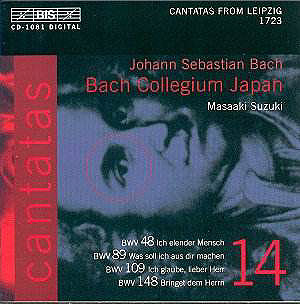This is Volume 14 of Masaaki Suzuki’s ongoing Bach
cantata cycle and it brings together four cantatas from the 1723 Leipzig
cycle. Probably because I already own an indecently large number of
CDs of Bach cantatas I have not previously investigated the releases
in this cycle. However, I have read many approving reviews elsewhere
of earlier releases. Having heard this disc I can understand why reviewers
have generally been enthusiastic.
The whole disc is characterized by lively, stylistically
aware performances by all concerned. The instrumental accompaniment
is consistently excellent, with some wonderful obbligato playing, and
the choir sings clearly and with a good, well-focused tone. Among the
soloists, Robin Blaze and Gerd Turk stand out in particular and it is
good that they have the most to do in these cantatas. Masaaki Suzuki
has clearly thought deeply about the music (as is clear from the notes
he provides about the solution to various textural issues) and he directs
with a real feel for the music.
The cantatas are all for Sundays after Trinity, respectively
the 17th Sunday (BWV 148); the 19th Sunday (BWV
48); the 22nd Sunday (BWV 89): and the 21st Sunday
(BWV 109). Apart from anything else, we can only marvel at the fact
that the same man could produce four such fine and varied cantatas in,
presumably, just six weeks.
The disc opens with BWV 148, a celebratory work as
is emphasized by the inclusion of a trumpet in the orchestral scoring.
A fine, confident opening chorus is followed by a florid tenor aria,
which is fluently sung by Gerd Turk, admirably supported by a nimble,
dancing violin obbligato. Robin Blaze is in equally fine form in the
succeeding recitative and aria. In the latter he is partnered by the
wonderfully plangent sound of two oboes and an oboe da caccia.
BWV 48, which the Leipzig congregation would have heard
just two weeks later, is a very different piece. The gospel for the
day tells the story of Christ healing a paralytic and the text of the
cantata, to which Bach responds avidly, draws a parallel between illness
and sin on the one hand, and healing and redemption on the other. The
chorus projects the opening chorus of lamentation with an appropriate
mixture of sadness and restraint. The structure of the cantata is a
little unusual in that after a dramatic recitative (eloquently delivered
by Robin Blaze) there follows not an aria but a chorale. Arias for alto
and tenor then follow. Each is sung with conviction and agility and
with a keen responsiveness to the text.
BWV 89 affords the first opportunity on the disc to
hear the soprano and bass soloists. Both voices were new to me. To Chiyuki
Urano falls the bass aria with which the work opens. His voice is a
fairly light bass and I found it just a trifle bland. Well though he
sings he doesn’t seem to me to command the expressive range of Robin
Blaze in the recitative and aria that follow. The soprano, Midori Suzuki,
also has a light voice. She sings with great clarity. Her brief aria
contains one of Bach’s typical, irresistible oboe obbligati. Suzuki
matches the oboist’s delicacy and gives a lovely, poised account of
the aria and it’s a pity that the programme doesn’t allow us to hear
much more of her than this.
To complete the programme we hear BWV 109. This, too,
is a work designed for a Sunday when the gospel told of a miracle of
healing. As presented here, the substantial opening chorus is unusual
in that there are contrasting passages for the soloists and for the
full choir. Masaaki Suzuki convincingly explains his reasons for this
performing decision in the booklet. Gerd Turk sings the big tenor aria
superbly. It is full of broken rhythms and harmonically difficult phrases.
Just to sing the notes accurately is a challenge but to sing them with
eloquence is a real achievement and is something which Turk manages
effortlessly. By contrast, the alto aria "radiates peace and certainty"
as the author of the notes puts it. Robin Blaze is just as fine as is
Turk in meeting the demands of this music.
Four fine and varied cantatas, all very well served
by Suzuki and his forces, who clearly have an intuitive understanding
of Bach’s many-faceted music. The sound is very good and the notes are
first class: informative and stimulating. Texts and translations are
provided to complete one’s pleasure in a most distinguished release.
John Quinn
Visit the Bach
Collegium Japan webpage for reviews of other releases in this series

 Bach Collegium Japan directed by Masaaki Suzuki
Bach Collegium Japan directed by Masaaki Suzuki